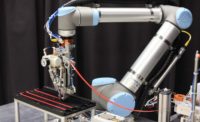TORONTO—Canadian tech startup Xaba and manufacturing technology company Rolleri Holding SpA are partnering to develop an autonomous collaborative robot work cell for welding.
Xaba has developed a new technology, xCognition, that lends artificial intelligence to robot control systems. The technology enables a robot to fully control its body and understand its environment using sensor data, such as images, sounds, temperatures and accelerations. The technology promises to make robots more accurate, consistent and easier to program.
To showcase the benefits of xCognition, Xaba and Rolleri recently completed ISO 9283 tests in Xaba’s robotics lab. A FARO Vantage laser tracker system was used to acquire the data needed to train the xCognition machine-learning model and to validate trajectory accuracy improvements. The tests showed that the robot had 10 times better improvement in absolute positioning and trajectory accuracy, and five times improvements in relative positioning and trajectory accuracy.
“We developed xCognition to provide a synthetic brain for commercial industrial robots and cobots used in a range of applications,” says Massimiliano Moruzzi, CEO of Xaba. “Our goal is to make it easier and much more efficient for anyone to adopt robotics for assembly, welding and drilling by significantly reducing the time required to calibrate, program and supervise robots. This partnership with Rolleri is an important step in enabling us to achieve this goal.”
“Rolleri’s mission is to provide the best solutions to our customers in compliance with three main requirements: quality, safety and economic advantage,” says Fabio Farina, general manager at Rolleri Robotics. “Artificial intelligence is going to play a key role in significantly reducing the effort and cost of adopting and successfully deploying automation in any shop floor, from small, mom-and-pop shops to large corporations.”
As a follow up to the initial tests, Xaba and Rolleri will be undertaking TIG and laser welding tests to further validate welding quality improvements, such as improved accuracy and repeatability.
For more information, visit xaba.ai.



